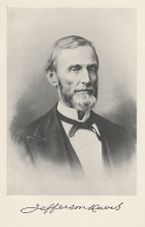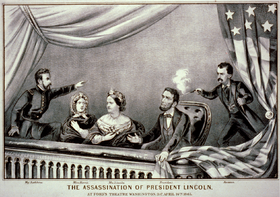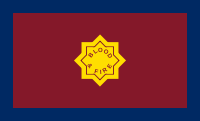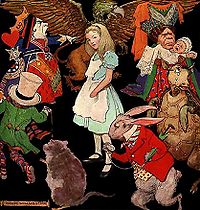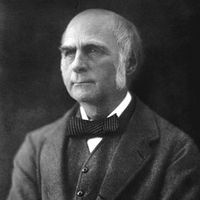1865
| Millennium: | 2nd millennium |
|---|---|
| Centuries: | 18th century – 19th century – 20th century |
| Decades: | 1830s 1840s 1850s – 1860s – 1870s 1880s 1890s |
| Years: | 1862 1863 1864 – 1865 – 1866 1867 1868 |
| 1865 in topic: |
| Subjects: Archaeology – Architecture – |
| Art – Literature (Poetry) – Music – Science |
| Sports – Rail Transport |
| Countries: Australia – Canada – China – France – Germany – Ireland – Mexico – Netherlands – New Zealand – Norway – South Africa – Spain – UK – USA |
| Leaders: State leaders – Colonial governors |
| Category: Establishments – Disestablishments |
| Births – Deaths – Works |
Year 1865 (MDCCCLXV) was a common year starting on Sunday (link will display the full calendar) of the Gregorian calendar (or a common year starting on Friday of the 12-day slower Julian calendar).
Contents |
Events of 1865
January–March
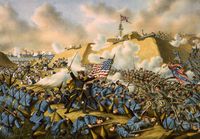
January 15: Union captures Fort Fisher.
- January 13 – American Civil War: The Second Battle of Fort Fisher begins when United States forces launch a major amphibious assault against the Confederate stronghold of Fort Fisher, North Carolina.
- January 15 – American Civil War: United States forces capture Fort Fisher.
- January 31 – American Civil War: Confederate General Robert E. Lee becomes general-in-chief.
- February – American Civil War: Columbia, South Carolina burns as Confederate forces flee from advancing Union forces.
- February 22 – Tennessee adopts a new constitution that abolishes slavery.
- March 3 – The U.S. Congress authorizes formation of the Freedmen's Bureau.
- March 4 – U.S. President Abraham Lincoln is inaugurated for a second term; Andrew Johnson becomes Vice President.
- March 13 – American Civil War: The Confederate States of America agrees to the use of African American troops.
- March 18 – American Civil War: The Congress of the Confederate States of America adjourns for the last time.
- March 19 – American Civil War: The Battle of Bentonville begins; by the end of the battle on March 21 the Confederate forces retreat from Four Oaks, North Carolina.
- March 25
- The "Claywater Meteorite" explodes just before reaching ground level in Vernon County, Wisconsin; fragments having a combined mass of 1.5 kg are recovered.
- American Civil War: In Virginia, Confederate forces capture Fort Steadman from the Union. Lee's army suffers heavy casualties during the battle of Fort Stedman—about 2,900, including 1,000 captured in the Union counterattack. Confederate positions are weakened. After the battle, Lee's defeat is only a matter of time.
April–June
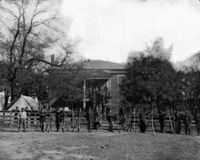
April 9: Appomattox Court House.
- April 1 – American Civil War – Battle of Five Forks: In Petersburg, Virginia, Confederate General Robert E. Lee begins his final offensive.
- April 2 – American Civil War: Confederate President Jefferson Davis and most of his Cabinet flee the Confederate capital of Richmond, Virginia, which is taken by Union troops the next day.
- April 6 – German chemicals producer Badische Anilin- und Sodafabrik(BASF) is founded in Mannheim.
- April 9 – American Civil War: General Robert E. Lee surrendered to Ulysses S. Grant at Appomattox Court House, effectively ending the American Civil War.
- April 14
- U. S. President Abraham Lincoln is shot at Ford's Theatre in Washington, D.C. by John Wilkes Booth.
- U.S. Secretary of State William H. Seward and his family are attacked in his home by Lewis Powell.
- April 15 – Vice President Andrew Johnson becomes the 17th President of the United States, upon the death of President Abraham Lincoln.
- April 18 – Confederate President Jefferson Davis and his entire cabinet arrive in Charlotte with a contingent of 1,000 soldiers.
- April 21 – German Chemicals producer BASF moves its headquarters and factories from Mannheim to the Hemshof District of Ludwigshafen.
- April 26
- Union cavalry corner John Wilkes Booth in a barn, and cavalryman Boston Corbett shoots the assassin dead.
- American Civil War: General Joseph Johnston surrenders his army to Major General William Tecumseh Sherman at Durham Station, North Carolina.
- April 27
- The steamboat Sultana, carrying 2,300 passengers, explodes and sinks in the Mississippi River, killing 1,700, most of whom were Union survivors of the Andersonville Prison.
- Governor of New York Reuben Fenton signs a bill formally creating Cornell University in the U.S.
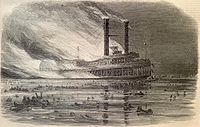
April 27: Sultana sinks.
- May 1 – The Triple Alliance of Argentina, Brazil and Uruguay against Paraguay is formally signed; the War of the Triple Alliance has already begun.
- May 4 – American Civil War: Lieutenant General Richard Taylor, commanding all Confederate forces in Alabama, Mississippi, and eastern Louisiana, surrenders his forces to Union General E.R.S. Canby at Citronelle, Alabama, effectively ending all Confederate resistance east of the Mississippi.
- May 5
- In North Bend, Ohio (a suburb of Cincinnati), the first train robbery in the United States takes place.
- Jefferson Davis meets with his Confederate Cabinet (14 officials) for the last time, in Washington, Georgia, and the Confederate Government is officially dissolved.
- May 10 – American Civil War: Jefferson Davis is captured by Union troops near Irwinville, Georgia.
- May 13 – American Civil War – Battle of Palmito Ranch: In far south Texas, more than a month after Confederate General Lee's surrender, the last land battle of the civil war ends with a Confederate victory.
- May 17 – International Telegraph Union founded.
- May 23 – Union troops parade down Pennsylvania Avenue in Washington, DC to celebrate the end of the American Civil War.
- May 25 – Mobile magazine explosion: 300 are killed in Mobile, Alabama when an ordnance depot explodes.
- May 29 – American Civil War: U. S. President Andrew Johnson issues a proclamation of general amnesty for most citizens of the former Confederacy.
- June 2 – American Civil War: Confederate forces west of the Mississippi under General Edmund Kirby Smith surrender at Galveston, Texas, becoming the last to do so.
- June 11 – Battle of Riachuelo: The Brazilian Navy squadron defeats the Paraguayan Navy.
- June 19 – American Civil War: Union Major General Gordon Granger lands at Galveston, Texas and informs the people of Texas of the Emancipation Proclamation. (an event now celebrated each year as Juneteenth).
- June 23 – American Civil War: At Fort Towson in Oklahoma Territory, Confederate General Stand Watie, a Cherokee Indian, surrenders the last significant Rebel army.
- June 25 – James Hudson Taylor founds the China Inland Mission at Brighton. England.
July–September
- July – The Christian Mission, later renamed the Salvation Army, is founded in Whitechapel, London by William and Catherine Booth.
- July 4 – Lewis Carroll publishes Alice's Adventures in Wonderland.
- July 5
- The U.S. Secret Service is founded.
- The first speed limit is introduced in Britain: 2 mph in town and 4 mph in the country.
- July 7 – Following Abraham Lincoln's assassination on April 14, the 4 conspirators condemned to death during the trial are hanged, including David Herold, George Atzerodt, Lewis Payne and Mary Surratt. Her son, John Surratt, escapes execution by fleeing to Canada, and ultimately to Egypt.
- July 14 – The summit of the Matterhorn in the Alps is reached for the first time; 4 of the party of 7 die in a fall during the descent.

July 14: Matterhorn climbed.
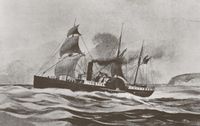
July 30: Steamer Brother Jonathan sinks.
- July 21 – In the market square of Springfield, Missouri, Wild Bill Hickok shoots Dave Tutt dead in what is regarded as the first true western showdown.
- July 27 – Welsh settlers arrive in Argentina at Chubut Valley.
- July 30 – The steamer Brother Jonathan sinks off the California coast, killing 225.
- July 31 – The first narrow gauge mainline railway in the world opens at Grandchester, Australia.
- August 25 – The Shergotty meteorite Mars meteorite falls in Sherghati, Gaya, Bihar, India.
October–December
- October 11 – Paul Bogle leads hundreds of black men and women in a march in Jamaica, starting the Morant Bay rebellion.
- October 25 – The paddlewheel steamer SS Republic sinks off the Georgia coast, with a cargo of $400,000 in coins.
- November 6 - American Civil War. Surrender to the British at Liverpool of the commerce raider CSS Shenandoah (Captain James Waddell), last significant organized Confederate unit.
- November 10 – Major Henry Wirz, the superintendent of a prison camp in Andersonville, Georgia, is hanged, becoming the only American Civil War soldier to be executed for war crimes.
- November 26 – Battle of Papudo: The Spanish ship Covadonga is captured by the Chileans and the Peruvians, north of Valparaiso, Chile.
- December 10 – Léopold II becomes King of the Belgians.
- December 11 – The U.S. Congress creates the House Appropriations Committee and the Committee on Banking and Commerce, reducing the tasks of the Committee on Ways and Means.
- December 18 – The Thirteenth Amendment to the United States Constitution (which forever abolishes slavery) is declared ratified by 3/4 of the states of the United States.
- December 21 – The Kappa Alpha Order is founded at Washington College.
- December 24 – Jonathan Shank and Barry Ownby form the Ku Klux Klan, to resist Reconstruction and intimidate "carpetbaggers" and "scalawags", as well as to repress the freed slaves.
Undated
- Gregor Mendel formulates his theories of Mendelian inheritance; they are mainly ignored for years.
- A forest fire near Silverton, Oregon destroys about one million acres (4,000 km²) of timber.
- The National Temperance Society and Publishing House is founded by James Black.
- Francis Galton, polymath inventor of the weather map and the silent dog whistle, introduces eugenics, after his half-cousin Charles Darwin.
Ongoing events
- American Civil War (1861–1865)
Births
| Gregorian calendar | 1865 MDCCCLXV |
| Ab urbe condita | 2618 |
| Armenian calendar | 1314 ԹՎ ՌՅԺԴ |
| Bahá'í calendar | 21 – 22 |
| Bengali calendar | 1272 |
| Berber calendar | 2815 |
| Buddhist calendar | 2409 |
| Burmese calendar | 1227 |
| Byzantine calendar | 7373 – 7374 |
| Chinese calendar | 甲子年十二月初四日 (4501/4561-12-4) — to —
乙丑年十一月十四日(4502/4562-11-14) |
| Coptic calendar | 1581 – 1582 |
| Ethiopian calendar | 1857 – 1858 |
| Hebrew calendar | 5625 – 5626 |
| Hindu calendars | |
| - Bikram Samwat | 1921 – 1922 |
| - Shaka Samvat | 1787 – 1788 |
| - Kali Yuga | 4966 – 4967 |
| Holocene calendar | 11865 |
| Iranian calendar | 1243 – 1244 |
| Islamic calendar | 1281 – 1282 |
| Japanese calendar | Genji 2Keiō 1 (慶応元年) |
| Korean calendar | 4198 |
| Thai solar calendar | 2408 |
January–June
- January 5 – Julio Garavito Armero, Colombian astronomer (d. 1920)
- January 10 – Mary Amelia Ingalls, blind older sister of author Laura Ingalls Wilder (d. October 20, 1928)
- January 27 – Nikolai Pokrovsky, Russian politician and last foreign minister of the Russian Empire (d. 1930)
- February 9 – Beatrice Stella Tanner aka Mrs. Patrick Campbell, actress & producer (d. 1940)
- February 28 – Alexander Henderson, American businessman (d. 1925)
- January 28 – Kaarlo Juho Ståhlberg, President of Finland (d. 1952)
- February 12 – Kazimierz Tetmajer, Polish writer (d. 1940)
- February 19 – Sven Hedin, Swedish scientist and explorer (d. 1952)
- February 21 – John Haden Badley, author and educator (d. 1967)
- February 28 – Wilfred Grenfell, medical missionary to Newfoundland and Labrador (d. 1940)
- March 10 – Tan Sitong, Chinese reformist leader (d. 1898)
- March 15 – Edith Maude Eaton, English-born writer (d. 1914)
- March 19 – William Morton Wheeler, American entomologist (d. 1937)
- April 1 – Richard Adolf Zsigmondy, Austrian-born chemist, Nobel Prize laureate (d. 1929)
- April 9
- Laurence Hope, English poetess (d. 1904)
- Erich Ludendorff, German general (d. 1937)
- Charles Proteus Steinmetz, German-American engineer and electrician (d. 1923)
- April 14 – Alfred Hoare Powell, English Arts and Crafts architect, and designer and painter of pottery (d. 1960)
- April 28
- May 2 – Clyde Fitch, American dramatist (d. 1909)
- May 3 – Henry Francis Bryan, governor of American Samoa (d. 1944)
- May 25
- John Mott, American YMCA leader, recipient of the Nobel Peace Prize (d. 1955)
- Pieter Zeeman, Dutch physicist, Nobel Prize laureate (d. 1943)
- May 26 – Robert W. Chambers, American artist (d. 1933)
- June 2 – George Lohmann, English cricketer (d. 1901)
- June 3 – King George V of the United Kingdom (d. 1936)
- June 9 – Albéric Magnard, French composer (d. 1914)
- June 9 – Carl Nielsen, Danish composer (d. 1931)
- June 13 – William Butler Yeats, Irish writer, Nobel Prize laureate (d. 1939)
- June 19 – May Whitty, British stage & screen actress (d. 1948)
- June 26 – Bernard Berenson, American art historian (d. 1959)
- June 29 – Shigechiyo Izumi, oldest supercentenarian male (disputed) (d. 1986)
July–December
- July 23 – Max Heindel, Danish-born Christian occultist, astrologer, and mystic (d. 1919)
- July 26 – Philipp Scheidemann, Chancellor of Germany (d. 1939)
- July 29 – Alexander Glazunov, Russian composer (d. 1936)
- August 2
- August 15 – Usui Mikao, Japanese founder of Reiki (d. 1926)
- August 24 – King Ferdinand of Romania (d. 1927)
- August 27
- James Henry Breasted, American Egyptologist (d. 1935)
- Charles G. Dawes, Vice President of the United States, recipient of the Nobel Peace Prize (d. 1951)
- September 11 – Rainis, Latvian poet and playwright (d. 1929)
- October 1 – Paul Dukas, French composer (d. 1935)
- October 12 – Arthur Harden, English chemist, Nobel Prize laureate (d. 1940)
- October 17 – James Rudolph Garfield, U.S. politician (d. 1950)
- October 22 – Raymond Hitchcock, American actor (d. 1929)
- October 26 – Benjamin Guggenheim, American businessman (d. 1912)
- October 27 – Tinsley Lindley, English footballer (d. 1940)
- November 2
- Warren G. Harding, 29th President of the United States (d. 1923)
- Paul Olaf Bodding, Norwegian missionary to India and creator of Santali latin alphabet (d. 1938)
- December 8 – Jean Sibelius, Finnish composer (d. 1957)
- December 16 – Olavo Bilac, Brazilian poet (d. 1918)
- December 19 – Minnie Maddern Fiske, American stage actress (d. 1932)
- December 20 – Elsie De Wolfe, American socialite and interior decorator (d. 1950)
- December 25 – Evangeline Booth, 4th General of The Salvation Army (d. 1950)
- December 25 – Fay Templeton, Broadway musical comedy star (d. 1939)
- December 30 – Rudyard Kipling, British writer, Nobel Prize laureate (d. 1936)
- See also Category: 1865 births.
Deaths
January–June
- January 19 – Pierre-Joseph Proudhon, French philosopher and anarchist (b. 1809)
- January 28 – Felice Romani, poet and librettist (b. 1788)
- February 6 – Isabella Beeton, British cook and expert on household management (b. 1836)
- March 1 – Anna Pavlovna of Russia, queen consort of the Netherlands (b. 1795)
- March 20 – Yamanami Keisuke, samurai (b. 1833)
- March 30 – Oleksandr Dukhnovych, priest, writer and social activist (b. 1803
- April 1
- April 2 – A.P. Hill, American Confederate general (b. 1825)
- April 13 – Achille Valenciennes, French zoologist (b. 1794)
- April 15 – Abraham Lincoln, 16th President of the United States (b. 1809)
- April 18 – Léon Jean Marie Dufour, French medical doctor and naturalist (b. 1780)
- April 24 – Grand Duke Nicholas Alexandrovich of Russia (b. 1843)
- April 26 – John Wilkes Booth, American actor and assassin of Abraham Lincoln (b. 1838)
- April 28 – Sir Samuel Cunard, Canadian business man & founder of the Cunard Line (b. 1787)
‘
July–December
- July 6 – Sophie of Sweden, Grand Duchess of Baden (b. 1801)
- July 25 – James Barry, British military surgeon (b. 1795)
- August 12 – William Jackson Hooker, English botanist (b. 1785)
- August 27 – Thomas Chandler Haliburton, Canadian author (b. 1796)
- September 2 – William Rowan Hamilton, Irish mathematician (b. 1805)
- October 16 – Andrés Bello, Venezuelan poet, lawmaker, teacher, philosopher and sociologist (b. 1781)
- October 18 – Henry John Temple, 3rd Viscount Palmerston, Prime Minister of the United Kingdom (b. 1784)
- November 12 – Elizabeth Gaskell, British novelist and biographer (b. 1810)
- November 28 – William Machin Stairs, Canadian businessman and statesman (b. 1789)
- December 6 – Sebastián Iradier, Spanish composer (b. 1809)
- December 10 – Léopold I of Belgium (b. 1790)
- December 14 – Johan Georg Forchhammer, geologist (b. 1794)
- December 17 – Luigi Ciacchi, Italian cardinal (b. 1788)
